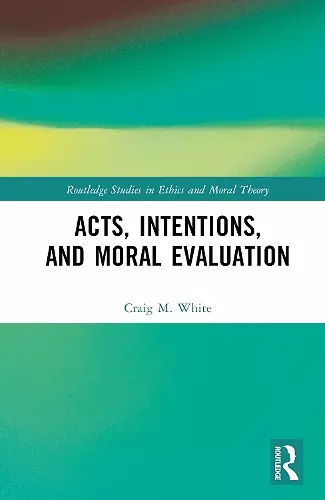Acts, Intentions, and Moral Evaluation
Format:Hardback
Publisher:Taylor & Francis Ltd
Published:27th Dec '22
Should be back in stock very soon

This book argues that the moral quality of an act comes from the agent’s inner states. By arguing for the indispensable relevance of intention in the moral evaluation of acts, the book moves against a mainstream, "objective" approach in normative ethics.
It is commonly held that the intentions, knowledge, and volition of agents are irrelevant to the moral permissibility of their acts. This book stresses that the capacities of agency, rather than simply the label "agent," must be engaged during an act if its moral evaluation is to be coherent. The author begins with an ontological argument that an act is a motion or a causing of change in something else. He argues that the source of an act’s moral meaning is in the agent: specifically, what the agent, if aware of relevant facts around her, aims to accomplish. He then moves to a series of critical chapters that consider arguments for mainstream approaches to act evaluation, including Thomson’s dismissal of the agent knowledge and volition requirements, Scanlon’s arguments for a derivative relevance of intentions to permissibility, Frowe’s "causal roles" of agents in the moral evaluation of acts, and Bennett’s explicit defense of the objective approach. The book concludes by offering the author’s preferred replacement for the objective approach, an Aristotelian-Thomist view of acts.
Acts, Intentions, and Moral Evaluation will be of interest to scholars and advanced students working in ethics, just war theory, the ethics of self-defense, and philosophy of action.
"Anscombe sounded the trumpet concerning the ethical import of intention. In this fine, rewarding, readable, slender volume Craig White thoroughly and fruitfully engages with those who aspire to avoid consequentialism while denying intent’s moral significance. White ably answers Anscombe’s call to arms in this philosophically deep defense of increasingly uncommon common sense. Recalling Anscombe’s admonition, one does well to read and learn from White’s engaging treatment of this crucially important topic."
T. A. Cavanaugh, Professor of Philosophy, University of San Francisco, USA
ISBN: 9781032298252
Dimensions: unknown
Weight: 520g
240 pages